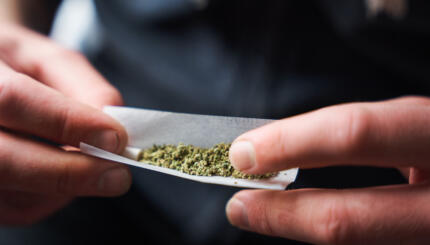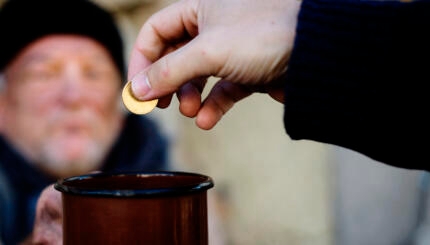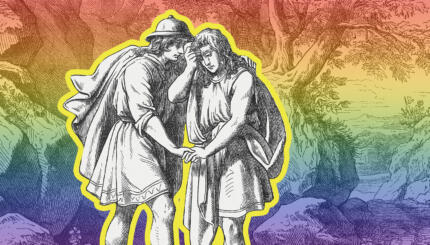I knew I only had five days in London, one of the most exciting cities in the world. What I learned after my whirlwind tour of contemporary London Jewish life is that the city is also one of the most exciting Jewish cities in the world.
Diverse Dinner
I landed on a Friday just in time for
with Wandering Jews, a Jewish non-institution that brings young, intelligentsia types together once a month, always in a different home, to celebrate Shabbat. Organized and energized by Naomi Soetendorp, recently named one of 40 British Jews under 40 to watch, Wandering Jews has two core philosophies: 1) that it is not an institution and therefore does not take money from anyone, and 2) that house rules apply. One month, London’s Jews may wander to the swanky flat of an observant stockbroker, who hosts a traditional mincha and ma’ariv service before dinner. Another night, WJ might sit on the floor eating latkes and spinning dreidels. This time, we wandered to the beautiful, split-level townhome of Ali Bodin Saphir, located right in the middle of London.

After a potluck vegetarian meal everyone was invited to share a reading related to the theme of connecting with your Jewishness. I shared my favorite passages from Martin Buber’s I-Thou. Poets and playwrights read, musicians and singers sang (in this case, in French, because of course this was a multi-culti, multi-lingual, pan-European, American expat, Israeli, British group of Jews), and several people told stories about their alienation from or connection to contemporary Jewish life.
It was at Wandering Jews that I finally met the fabulous Mekella Bromberg, assistant director of London’s Jewish Book Festival and the person who brought me to London to present the book I recently co-edited, Torah Queeries.
During the dinner, I received an unexpected phone call, from the BBC World Service, which wanted me on a Sunday morning radio show to talk about queer interpretations of the Bible. Queer Bible on BBC World Service? How odd and exciting. I’ll admit that I was a bit nervous. The only other time I had been on Sunday morning talk radio was in 2002, when I was invited to do a program about my book Queer Jews (do you notice a theme?).

Help us keep Jewish knowledge accessible to millions of people around the world.
Your donation to My Jewish Learning fuels endless journeys of Jewish discovery. With your help, My Jewish Learning can continue to provide nonstop opportunities for learning, connection and growth.
Queeries on BBC
That call-in program had drawn from a local American audience, and you can imagine the kind of callers who are listening to the radio on Sunday at 7am–church-goers wondering if I knew I was going to hell (I guess double hell for being gay and Jewish), and one meek- voiced man, whom we all thought was going to come out on radio. BBC World Service speaks live to the whole world, a fact the producer emphasized to me over and over in preparing for the interview. After doing the time-zone math, I realized that I would be speaking to British expats in India, diplomats in Kenya, and factory owners in China…about queer interpretations of the Hebrew Bible.
I didn’t get a full 15 minutes the way Andy Warhol promised, but it was a fantastic experience, even though the two interviewers sensationalized Torah Queeries by asking if there might be death threats against the editors for blaspheming the Holy Book. (If only…it might improve sales!)
Back at the Book Festival
London takes its literature and its Jewish Book Festival very seriously. In addition to the centuries-old Jewish Chronicle, London also has a glossy Jewish literary magazine, Jewish Quarterly, that is intellectual and unapologetically left wing when it comes to culture, community, and politics. As for the book festival, as much as it is a Jewish community event, it is, first and foremost, an important literary event. Non-Jewish friends of mine in London’s book world all knew about the Jewish Book Festival, and some planned to attend.
The festival takes place not in the heart of Jewish London, but in a slightly worn Bloomsbury hotel, and the organizers take special care to curate a week of literature that exposes people to important contemporary issues. There were books on atheism, on vegetarianism and the contemporary food movement, on sex and sexuality, and of course on Israel and the Middle East from diverse perspectives.
My program called “Queer Jewish Culture,” which I had feared might be seen as a “niche” program and therefore draw a small crowd, was standing room only. About 100 people crammed into a stuffy room to hear three academics argue about LGBT Jewish visibility vs. invisibility, whether or not queer Jewish culture was a particularly American phenomenon, and over the very definition of queer.
Most interesting was the debate about the US versus Britain. If Americans wear their identities on their sleeves, British Jews are “quiet” when it comes to identity labels, at least according to one audience member. Others, though, were a little more forthright about what they perceived as an American imperialistic attitude to queer Jewish culture, expressing frustration at an American presumption that nothing interesting and progressive has ever or will ever come out of Britain.
I had heard this in other venues when audience members complained that our book had more than fifty authors, none of them English, despite the fact that there are several very visible LGBT rabbis in England and a history of gay Jewish activism. In fact, Leo Baeck College ordained two openly lesbian rabbis back in the 1980s–Sheila Shulman and Elizabeth Tikvah Sarah–and the two of them have been leaders of Reform Judaism in England ever since. And London had its first gay Jewish group way back in 1972 when 190 people responded to an ad in the gay paper and eventually established the Jewish Gay and Lesbian Group (JGLG).
British Activism
For me, the take away was that the Brits may be quiet about their identities and therefore lack the visible institutional infrastructure of American LGBT Jewish life that led to events like the June 2010 LGBT Jewish conference on inclusion. Nonetheless, they do have queer identities and have been organizing around them for years.
After Sunday’s BBC interview and Jewish Book Festival presentation, I had perhaps my strangest 24 hours in London. I presented Torah Queeries to three radically different audiences–a Reform rabbinic seminary, an academic interfaith institute at Cambridge, and a liberal synagogue with a large LGBT contingent.
Although my overall message was similar, each audience approached me and the Bible differently. The scholars and rabbis at Leo Baeck rabbinic seminary spent their time with me doing close textual readings in classic Jewish tradition; at august Cambridge I explained Jewish interpretive traditions to a primarily non-Jewish audience. The West Central Liberal Synagogue had the most energized audience that included several LGBT Jewish rabbinic leaders, each of whom shared their own queer readings of the Bible.
Jewish London proved to be more radical and boundary pushing than I imagined. I had glimpses of non-institutional Judaism with quality vegetarian food and the elusive under-40 crowd, literary culture that put books in service of generating provocative conversation, lively debate about Israeli policies, and I discovered a 30-year history of queer British Jewish organizing that may be “quiet,” but has been active as long as their counterparts across the pond.


